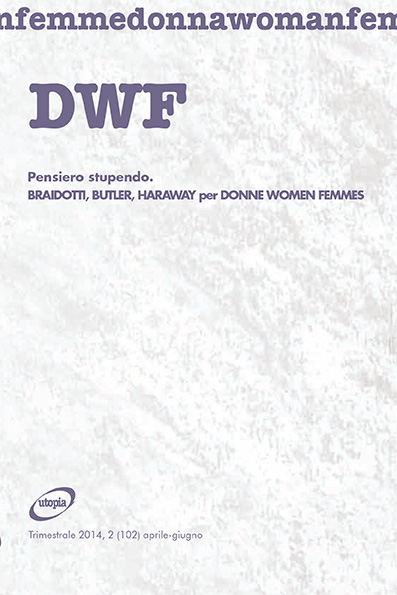L’idea di un numero dedicato ad alcune grandi pensatrici dei femminismi degli ultimi trent’anni nasce da un’occasione e da un desiderio. L’occasione è stata l’incontro con una di loro, Judith Butler, al XV Simposio Iaph 2014 in Spagna. Il desiderio, che è alla base della pubblicazione e che non si esaurisce con essa, è quello di confrontarsi con le donne autorevoli
che hanno fatto e continuano a fare la storia del pensiero femminista. Judith Butler, Rosi Braidotti e Donna Haraway sono le protagoniste di Materia.
La sezione si apre con un’intervista di Federica Castelli a Butler, un confronto diretto e in presenza, dal quale emerge una vicinanza tra il pensiero di una delle teoriche della performatività e le urgenze delle femministe dell’oggi. Emerge la necessità per i movimenti delle donne di agire nuove pratiche, di ripensare l’intero spazio pubblico e di indagare
le nuove condizioni storiche, la relazione tra corpo e precarietà che dà vita a “nuove figure di spossessamento” (dispossession). Emerge ancora una volta la questione del linguaggio (che DWF ha affrontato nel numero 101) quando è la stessa Butler a chiedersi: “Il femminismo possiede gli strumenti concettuali necessari a comprendere cosa sta accadendo storicamente – cosa sta accadendo in Europa, nell’Europa mediterranea, cosa sta accadendo attraverso la globalizzazione –, abbiamo un linguaggio adatto a descrivere questi vari processi?”
Seguono quattro saggi che raccontano il pensiero teorico e politico delle protagoniste di questo numero. Abbiamo scelto la pratica della rilettura – una formula che si è mostrata già in altre occasioni un efficace strumento di dialogo – che prende vita attraverso le lenti dello studio e dall’azione politica delle singole autrici che, dalla loro esperienza e dal vissuto qui e ora, ci restituiscono il pensiero di Butler, Braidotti e Haraway. Dialoghi che da una parte ripercorrono il pensiero di queste grandi autrici e dall’altra interrogano nuovamente tale pensiero sul presente.
Riportare il percorso teorico e politico, raccontarne i punti cruciali e analizzarne l’evoluzione negli anni è un compito arduo, ma permette alle nostre lettrici di inquadrare le pensatrici e collocare nel tempo e nello spazio i percorsi delle loro teorie.
Ne è un esempio particolarmente efficace il saggio di Monica Pietrangeli su Butler. Le riletture hanno inoltre la forza di riattualizzare alcuni tratti di queste teorie, cogliendone delle tracce significative per sé, per i propri percorsi di studio e di riflessione politica (Bonacchi e Bruno su Haraway), di pratica politica (Chiricosta su Braidotti). Sono riletture che quindi tengono insieme almeno due piani fondamentali: il primo orizzontale, necessario per guardare complessivamente le
tante evoluzioni di pensieri e teorie delle autrici, e il secondo verticale, che si permette di immergersi in quei tratti che più hanno significato per le nostre ricettrici all’oggi.
Poliedra si lega a doppia mandata all’inizio di Materia: Paola Masi ha tradotto un testo di Athena Athanasiou, filosofa e femminista greca, che mette al centro la politica del corpo genderizzato nata nelle proteste antiausterità in Grecia nel contesto dell’attuale crisi debitoria. Torna prepotente la relazione stretta tra i corpi e la precarietà delle vite nel tempo della crisi – e si delinea una prospettiva molto rischiosa, quella della dispossession, di cui parla Butler nel suo ultimo omonimo libro –, in uno scambio reale tra la femminista greca e la pensatrice statunitense di cui si percepisce la contaminazione filosofico-politica. In questo filo rosso di letture e riletture, dove le esperienze, le piazze, i corpi, si incontrano, un saggio come questo ci fornisce una prospettiva più ampia, allarga la visuale su un paese molto vicino, la Grecia, raccontandoci dei fantasmi neo nazisti che hanno preso corpo, anche nelle istituzioni, e che agiscono violentemente sui corpi delle donne, delle persone omosessuali, degli stranieri, dei malati. Ci racconta le politiche conservatrici neoliberali fondate sul controllo dei corpi, ma anche le pratiche femministe e queer di resistenza.
Rileggere e riproporre alle nostre lettrici i saggi di autrici importanti che DWF ha pubblicato in passato è il fondamento del progetto editoriale Ciliegie, nato lo scorso anno. Quello che facciamo con questo numero invece è confrontarci direttamente e indirettamente con alcune pensatrici contemporanee che nei decenni hanno segnato profondamente le teorie e le pratiche dei movimenti femministi, alcuni dei quali sorti proprio attorno al loro pensiero. Si tratta di donne che con le loro parole hanno acceso scintille di fuochi che ancora ardono, ma che non sono rimaste a guardare le fiamme esaurirsi, bensì hanno alimentato quei fuochi continuando a pensare, scrivere, costruire e decostruire mondi. I loro pensieri
sono potuti diventare teorie e pratiche di lotta perché rimasti vivi – e quindi in movimento – e aderenti al mondo. Per questo, stupendi.
(tdm e vlm)

